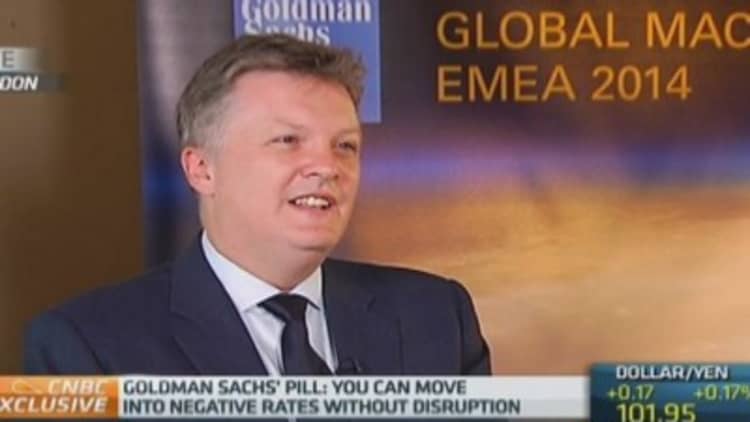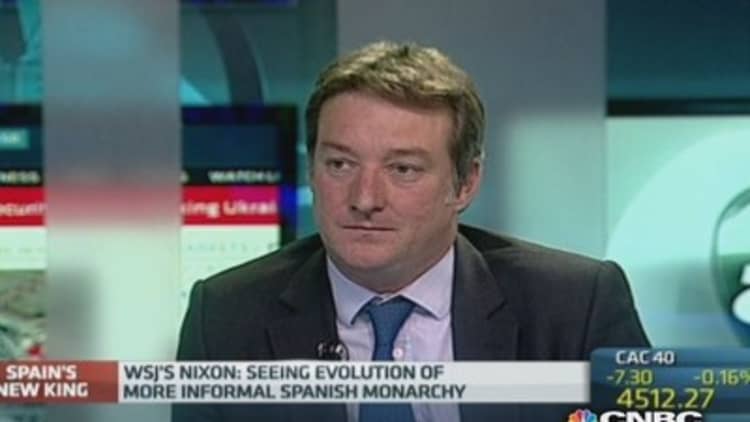Monday's announcement from Spain's King Juan Carlos that he was to step down, making way for his son Felipe, grabbed headlines around the world. But the country may gain more attention this week when Prime Minister Mariano Rajoy unveils a 6.3 billion euro ($8.6 billion) stimulus package after years of growth-sapping austerity.
The last years of Juan Carlos' reign saw Spain teeter on the brink of financial collapse, as the government struggled to support banks hit hard by a burst real estate bubble. The country embarked on a series of painful cuts and reforms to balance its books, sending the country into recession and unemployment soaring. The austerity measures drew criticism from economists—and a large number of protesters—that they were too much, too soon.
During this time, the king cut a controversial figure, going on elephant hunts while the country neared economic collapse, and his daughter and her husband were embroiled in a corruption probe.
Now, Spain is turning the corner, to the point where the government believes the time is right to boost Spain's nascent economic recovery. Rajoy announced the stimulus' launch in a speech to business leaders over the weekend. The measures will likely be the last significant economic reform effort ahead of Spanish national elections next year.
Measures are expected to include cutting the corporate tax rate to 25 percent from 30 percent. In addition, a 750 million euro package dedicated to enhancing competitiveness is likely, along with a 325 million euro credit line for technology development and 600 million euros to boost R&D.
Goldman Sachs Chief European Economist Huw Pill said Spain's new program followed a period of "very deep austerity" that had been "too much, too soon."
"Certainly, there is a need for further consolidation through time in Spain in order to get to a more sustainable long-term situation. But as has always been in the case, the question is, how fast can you proceed with that?" Pill told CNBC at a Goldman Sachs conference on Monday.
"Spain, if anything, did too much, too soon, and that very aggressive austerity in the early years of adjustment had this tremendous cost in terms of growth and perhaps was unduly costly on that dimension."

Meanwhile, Juan Carlos' abdication and Felipe's succession could go some small way to soothing the political and social upheaval that Spain's austerity measures have fueled.
Read MoreIn Spanish riots, anguish of those recovery forgot
"The succession is likely to have some limited influence on the relationship between the central government and the separatist challenge in both Cataluña and the Basque Country," said Pepe Egger, senior analyst at IHS Country Risk, in a research note on Monday.
Rajoy to follow ECB
Rajoy's announcement will follow the European Central Bank (ECB)'s policy meeting on Wednesday, at which new measures to support credit and economic growth in the euro zone are widely expected to be announced. Possibilities include a base rate cut of 15 basis points, negative interest rates on funds deposited by banks with the ECB and credit easing via public or private asset-purchases.
With this in mind, Pill said that Spain's program would reflect an ongoing trend across the euro zone away from austerity.
"Draghi's measures are designed to support growth. On some level, that is what Europe needs at this stage," he told CNBC.
The European Commission forecast the Spanish economy will grow by 1.1 percent in 2014 and 2.1 percent in 2015, following two successive years of contraction.

Alberto Gallo, head of European macro credit research at RBS, said that Spain will still carry on cutting its deficit in spite of the new program, but more work in that direction was still needed.
The European Commission has forecast that Spain will miss its budget deficit target of 4.5 percent, for 2015, which will instead come in at 5.8 percent.
Debt will rise above 100 percent of GDP this year, and won't stabilize until 2017, according to the International Monetary Fund—two to three years after most other euro area countries
"Rajoy's planned stimulus amounts to just 0.6 percent of GDP and includes measures already announced or in place, so is unlikely to materially affect the government's deficit-cutting strategy, but Spain still needs to do more to stabilize its public finances," he said in a research note on Monday.

